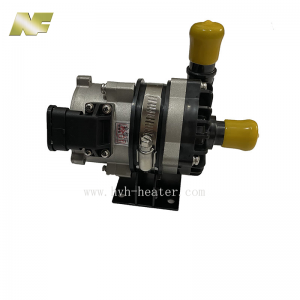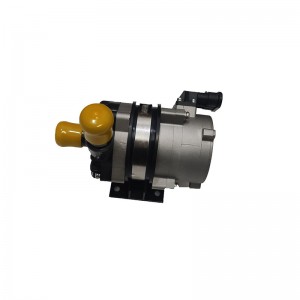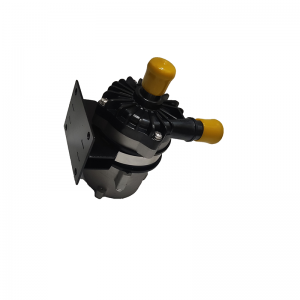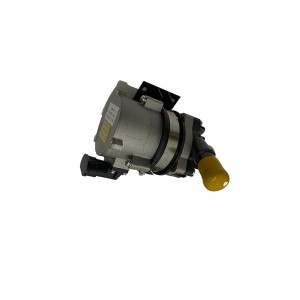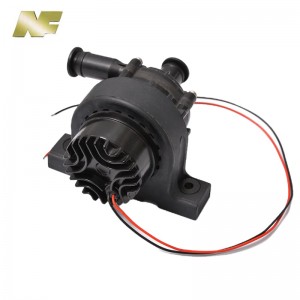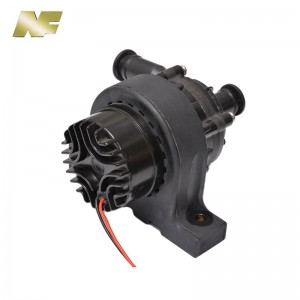NF 12v electric water pump for new energy vehicles
Description
These water pumps are specially designed for heat sink cooling system and air condition circulation system of new energy automotive.
All pumps also can be controlled through PWM or CAN.
Electric vehicles (EVs) are gaining widespread adoption as the automotive industry progressively transitions toward more sustainable and environmentally responsible transportation solutions. A critical component of an electric vehicle that is often overlooked is the electronic water pump, also known as the electric vehicle coolant pump. This advanced technology is critical for maintaining optimal thermal conditions in a vehicle’s electric powertrain and battery systems.
In contrast to conventional internal combustion engine vehicles, electric vehicles require sophisticated cooling systems to effectively regulate the temperature of the electric motor and battery pack. Electronic water pumps are specifically designed to circulate coolant throughout an electric vehicle’s thermal management system, ensuring components operate within the ideal temperature range. This is essential for maximizing the efficiency, performance, and service life of a vehicle’s electric powertrain.
One of the key advantages of electronic water pumps in electric vehicles is their independent operation relative to the vehicle’s engine. This enables the coolant pump to continue functioning even when the vehicle is turned off, helping to prevent overheating and ensuring that electrical components remain within safe thermal limits. Furthermore, electronic water pumps demonstrate superior energy efficiency compared to traditional mechanical pumps, thereby enhancing the overall effectiveness of electric vehicle cooling systems.
Another critical feature of electronic water pumps is their reliability and durability. These pumps are specifically engineered to meet the demanding thermal and operational conditions of electric vehicles, including exposure to high temperatures and continuous usage. By maintaining precise thermal control, electronic water pumps contribute significantly to the performance and long-term dependability of electric vehicles.
Moreover, the adoption of electronic water pumps aligns with the automotive industry’s broader sustainability goals. Through optimized cooling system performance, these pumps support the efficient operation of electric vehicles, leading to reduced energy consumption and a lower environmental footprint.
In conclusion, electronic water pumps are a fundamental component in the thermal management systems of electric vehicles. As the demand for electric mobility continues to rise, the development and integration of advanced cooling technologies—such as electronic water pumps—are essential for ensuring the optimal performance and longevity of electric powertrains and battery systems. With their energy-efficient operation and robust design, electronic water pumps play a pivotal role in advancing sustainable transportation solutions.
Technical Parameter
| Ambient temperature | -40~+100ºC |
| Rated Voltage | DC12V |
| Voltage Range | DC9V~DC16V |
| Waterproofing Grade | IP67 |
| Current | ≤10A |
| Noise | ≤60dB |
| Flowing | Q≥900L/H (when the head is 11.5m) |
| Service life | ≥20000h |
| Pump life | ≥20000 hours |
Advantage
*Brushless motor with extended service life
*Low power consumption and high operational efficiency
*Hermetic magnetic drive design prevents water leakage
*User-friendly installation process
*Protection rating: IP67
1. Constant power operation: The water pump maintains stable power output within the voltage range of DC 24V–30V.
2. Overtemperature protection: When the ambient temperature exceeds 100 °C (the upper limit threshold), the pump activates its self-protection mechanism. To ensure long-term reliability, it is recommended to install the pump in a location with good airflow or lower ambient temperature.
3. Overvoltage protection: The pump can withstand an input voltage of DC 32V for 1 minute without internal circuit damage.
4. Blockage protection: If foreign material enters the pipeline and causes the pump to stall, the current will rise sharply, triggering the pump to stop rotating. After 20 consecutive restart attempts, the pump will enter a locked state. Normal operation can be resumed after clearing the blockage and restarting the pump.
5. Dry-run protection: The pump is capable of operating safely for 15 minutes or less in the absence of a circulating medium.
6. Reverse polarity protection: When subjected to a reverse voltage of DC 28V for 1 minute, the internal circuitry remains undamaged.
7. PWM speed control functionality
8. High-level output capability
9. Soft start feature
Application

FAQ
Q: What is a car electric water pump for buses?
Answer: The passenger car electric water pump is a device used to circulate the coolant in the passenger car engine cooling system. It runs on an electric motor, which helps keep the engine at an optimum temperature.
Q: How does the car electric water pump work?
A: The car's electric water pump is connected to the engine's cooling system and is powered by the vehicle's electrical system. After starting, the electric motor drives the impeller to circulate the coolant to ensure that the coolant flows through the radiator and engine block to effectively dissipate heat and prevent overheating.
Q: Why are electric water pumps for cars important for buses?
A: An automotive electric water pump is critical for buses as it helps maintain proper engine temperature, which is critical for reliable and efficient performance. It prevents the engine from overheating, reduces the risk of engine damage and ensures the longevity of the vehicle.
Q: Does the car's electric water pump show signs of trouble?
A: Yes, some common signs of a car electric water pump failure include engine overheating, coolant leaks, unusual noise from the pump, and obvious damage or corrosion to the pump itself. If you notice any of these symptoms, it is recommended to have the pump checked and replaced if necessary.
Q: How long can a car electric water pump usually last?
Answer: The service life of the electric water pump of the car will vary due to factors such as the use, maintenance and quality of the water pump. On average, a well-maintained pump will last 50,000 to 100,000 miles or more. However, regular inspection and replacement (if necessary) is essential to ensure optimum performance.
Q: Can I install a car electric water pump on the bus myself?
A: While it is technically possible to install an automotive electric water pump on a bus yourself, it is highly recommended to seek professional help. Proper installation is critical to pump performance and life, and professional mechanics have the expertise and tools needed for a successful installation.
Q: How much does it cost to replace the car's electric water pump with a bus?
A: The cost of replacing an automotive electric water pump for a bus can vary depending on the make and model of the vehicle and the quality of the pump. On average, the cost ranges from $200 to $500, including the pump itself and installation labor.
Q: Can I use a manual water pump instead of an automatic electric water pump?
A: In most cases, it is not recommended to replace an automatic electric water pump with a manual water pump. The automatic electric water pump runs more efficiently, is easier to control, and provides better cooling. Additionally, modern passenger car engines are designed to work with the car's electric water pump, replacing it with a manual water pump could compromise engine performance.
Q: Are there any maintenance tips for car electric water pumps?
A: Yes, some maintenance tips for your car's electric water pump include regularly checking the coolant level, checking for leaks or damage, ensuring proper tension and alignment of the pump belt, and following the manufacturer's recommended maintenance schedule. Also, it is important to replace the pump and other cooling system components at specified intervals to avoid any potential problems.
Q: Will the failure of the car's electric water pump affect other parts of the engine?
A: Yes, a car electric water pump failure can have a major impact on other engine components. If the pump isn't circulating the coolant properly, it can cause the engine to overheat, which can lead to damage to the cylinder head, gaskets, and other critical engine components. That's why it's crucial to fix water pump problems promptly to prevent further damage.



